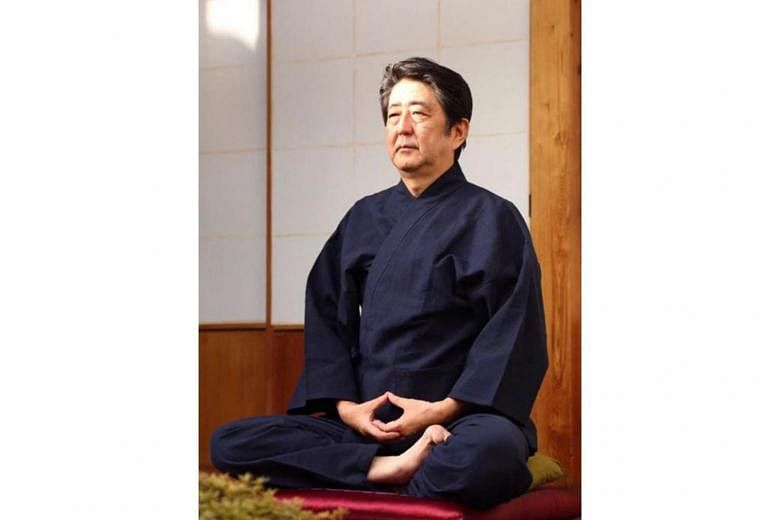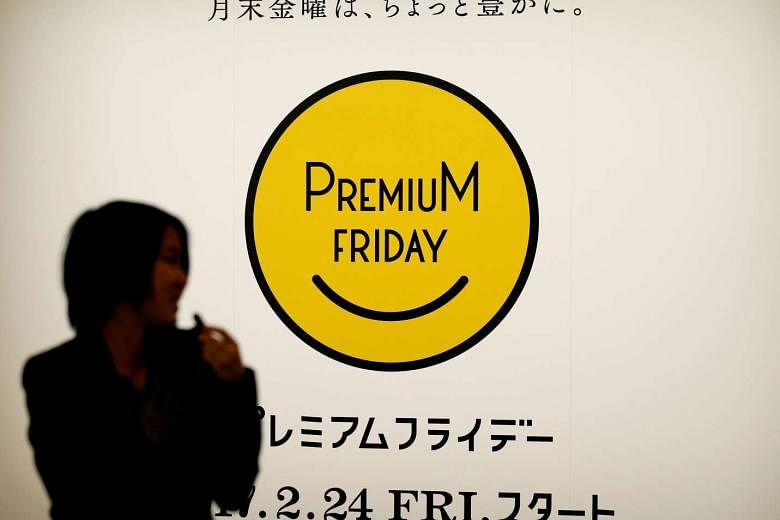TOKYO (AFP) - Japan's Prime Minister will spend Friday (Feb 24) afternoon meditating while staff at some of the country's biggest firms are also quitting work early - in time for a bit of shopping or maybe a boozy train ride.
Welcome to Premium Friday, Japan's latest bid to tackle two perennial problems - sluggish consumer spending and notoriously long working hours blamed for a national health crisis known as karoshi, or death from overwork.
The work-life balance campaign, which launches this week, calls on employers to let staff off around 3:00 pm on the last Friday of every month.
Major firms such as automakers Nissan and Toyota, beverage giant Suntory and brokerage Nomura are taking part in the government-backed scheme.
Thousands of other firms are offering promotions to workers who will have a bit of extra time on Fridays.
Mobile carrier SoftBank is letting staff quit early and, later this year, will be putting an extra 10,000 yen (S$125) in their pockets.
One railway operator is offering a special train ride with beer and bento boxes, while off-early workers can also get discounts on everything from matchmaking services to cancer checks.
Prime minister Shinzo Abe will be taking it down a notch by spending the afternoon at a Zen meditation temple, followed by a music concert.
So says top government spokesman Yoshihide Suga who is also kicking off early - as soon Friday's press briefing was done.
"Unfortunately I have to hold this press conference at your request," he told reporters in Tokyo.
"But as soon as I'm done with this, I'm going to doing something" for Premium Friday, he added.
Every year, Japan's notoriously long working hours are blamed for hundreds of deaths due to strokes, heart attacks and suicides, along with a host of serious health problems.
The issue was highlighted again in late December when the head of Japan's biggest advertising agency Dentsu resigned in response to the suicide of a young employee who regularly logged more than 100 hours of overtime a month.
More than one in five Japanese companies have employees who work such long hours they're at serious risk of death, according to a government survey released in October.
Japan's long working hours spawned the image of the weary salaryman who worked all day, drank with the boss all night, and was back at his desk early in the morning.
That punishing work culture has softened over the decades, but putting in long hours is still seen as a sign of dedication at many Japanese firms.
"We're hoping to boost spending by changing our lifestyle, the way we work and the way we think," Masanao Ueda, director of major business lobby Keidanren's Industrial Policy Bureau, told AFP.
"It's hard for Japanese workers to take a day off so we need to create conditions in which everyone can take a holiday." But it could be hard sell.
Many Japanese employees don't even take all of their regular annual leave and firms are not helping with the needed wage hikes.
And only a small fraction of Japan's firms are taking part in the non-mandatory scheme.
"This campaign will not suddenly boost spending or stop long working hours," said Naoko Kuga, analyst at Tokyo's NLI Research Institute.
"It's not even mandatory for workers to leave early."


